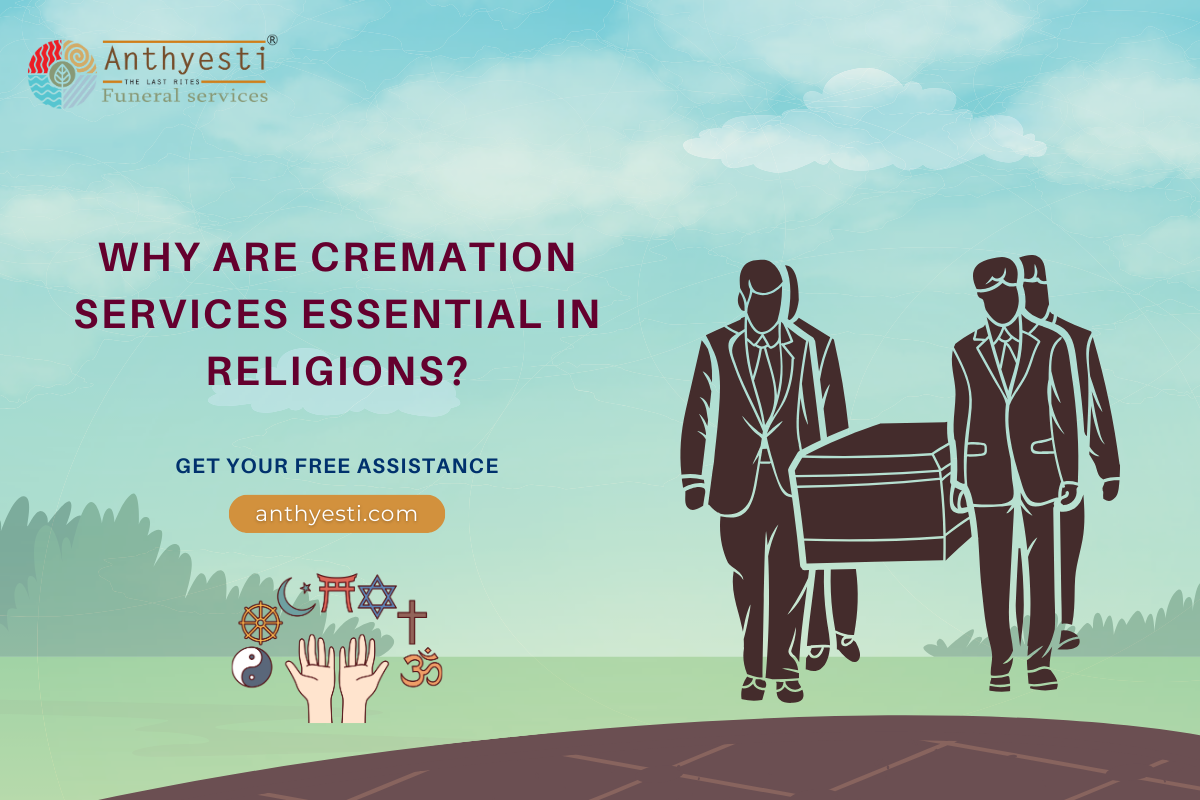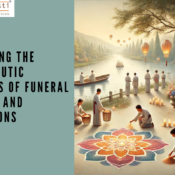
Why are Cremation Services essential in religions?
In the tapestry of religious traditions, cremation services emerge as a profound expression of faith, bridging the earthly realm with spiritual transcendence. Across diverse cultures and beliefs, the significance of cremation is deeply rooted, embodying spiritual symbolism and cultural heritage. Anthyesti Funeral Services stands as a beacon within this intricate landscape, honoring the sanctity of cremation services with sensitivity and reverence. In this exploration, we delve into the essential role of cremation services in religions, unraveling the timeless significance they hold in facilitating the transition from life to afterlife while upholding the cherished values and beliefs of diverse spiritual communities.
Hinduism and Cremation
In Hinduism, the practice of cremation, known as “antim sanskar” or “antim yagna,” is a sacred ritual deeply rooted in the belief of reincarnation. The act of cremation is seen as a means to release the soul from the physical body, allowing it to be reborn in another form. Fire, considered a purifying element, plays a crucial role in freeing the spirit. Anthyesti Funeral Services recognizes the importance of these customs and ensures a respectful and traditional Hindu cremation process.
During a Hindu cremation ceremony, the body is placed on fragrant wood at the cremation grounds. Family members bid their final farewells before the funeral pyre is lit. As the body burns, close relatives perform a ritual circling the pyre, and the ashes are collected afterward. Traditionally, these ashes find their final resting place in sacred rivers like the Ganges or are preserved in urns.
Buddhism and Green Burials
Buddhist traditions, while generally flexible about burial or cremation, lean towards cremation in countries with Buddhist majorities such as Thailand, Sri Lanka, and Japan. After cremation, the ashes may be scattered or placed in a columbarium. Some Buddhists, adhering to principles of non-attachment and environmental respect, opt for green burials. This involves burying the body in a shroud, without chemicals, in a natural burial ground to return the body to the earth in an eco-friendly manner.
Judaism and Traditional Burials
In Judaism, the preferred and respectful method is traditional earth burial according to Jewish law. While cremation was historically forbidden for religious reasons, some Reform Jewish movements now allow it. The traditional Jewish burial involves placing the body in a simple wooden coffin and lowering it into the ground. The mourning period in Judaism is extended to honor the deceased, and the grave is marked with a simple headstone.
Christianity and Varied Practices
Christian traditions exhibit diverse stances on cremation versus burial. The Roman Catholic Church, initially hesitant, accepted cremation as a practice in 1963. Protestant denominations usually permit both burial and cremation based on individual preferences. Orthodox Christianity tends to favor traditional earth burials, but after cremation, ashes may find a resting place in a cemetery or columbarium.
Islam and Prioritizing Burial
In Islam, the ideal method of interment is traditional earth burial, emphasizing prompt burial, usually within 24 hours of death. Cremation is strictly forbidden and deemed disrespectful to the human body, as Muslims believe in the physical resurrection of the body on the Day of Judgment. Islamic burials involve washing and shrouding the body, funeral prayers, and placing the body in a simple grave facing Mecca.
Cultural Sensitivity Around Death Rituals
As evident in this overview, diverse religions approach death and burial according to their respective worldviews and scriptures. Modern practices are evolving, but traditions still significantly influence how communities grieve and memorialize their loved ones. Effective communication is essential to serve bereaved families in a manner aligned with their faith and heritage.
Meeting Practical Needs During a Difficult Time
- Simplified Planning and Decision Making: Cremation offers a streamlined process compared to traditional burial funerals, reducing complexity during challenging decision-making moments. Grieving relatives are spared the need to choose burial plots and vaults, easing the decision-making burden.
- Flexibility in Timing and Location of Services: Cremated remains can be temporarily kept if burial or memorial services are delayed, offering flexibility for out-of-town family members to travel. Services can be held at convenient locations, transcending geographical constraints.
- Reduced Transportation Barriers: The lightweight nature of urns minimizes handling requirements and facilitates easy transport in vehicle trunks or airline luggage. This eases the logistical and physical burden of transporting remains, particularly when services are held in multiple locations.
- Minimal Disruption to End-of-Life Events: Cremation allows visitations and services to focus solely on remembering the deceased without restrictions on casket presence or viewings. Grieving processes, such as open mic sessions, face fewer constraints.
- Ease of Compliance with Travel Requirements: Stringent rules for transporting human remains across borders are prevalent in many countries. Cremated ashes encounter minimal screening at security and customs, facilitating the transportation of remains abroad.
- Overall Convenience for Families in Mourning: Cremation services aim to lighten logistical loads during emotionally draining times by streamlining the many moving parts involved. Their focus is on supporting ease, flexibility, and convenience for grieving loved ones.
Conclusion
In the complex tapestry of cultural and religious practices surrounding death, cremation stands out as a choice that bridges spiritual and practical needs. While it may not align with every religious belief, its rising popularity indicates a shift in how communities choose to bid farewell to their departed. The compassionate services provided by institutions like Anthyesti Funeral Services ensure that the final journey is a reflection of the departed’s faith and a source of comfort for those left behind.
Every community has its unique way of saying goodbye, rooted in its spiritual traditions. As populations grow and diverse perspectives emerge, funeral professionals play a crucial role in understanding and respecting these varied practices. Whether it’s burial or cremation, the primary goal is to create space for grieving and remembering, easing the journey towards acceptance rather than adding undue stress. Through open communication and care, funeral homes can honor the departed in ways that hold the deepest meaning for the loved ones left behind.
In India, Anthyesti Funeral Services stands out as a premier provider of cremation services, offering support for repatriation overseas and various funeral needs within the country. For those seeking comprehensive funeral services, whether online or offline, Anthyesti Funeral Services’ dedicated support team.
Call us at +91-98833-18181
All Categories
- Ambulance (6)
- Anthyesti Biopic Cinema (11)
- Blogs (330)
- Condolences (8)
- Cremation Center (10)
- Cremation Service (58)
- Dead Body Carrier (20)
- Dead Body Freezer Box (49)
- Dead Body Transport (132)
- dead body van (3)
- Death Ceremony (8)
- FAQ (18)
- Freezer box (20)
- Funeral Communities (10)
- Funeral Service (53)
- General (5)
- hearse van service (48)
- Last Rites Pujas (2)
- Last Rites Rituals (10)
- Media Mentions (9)
- Pind Daan (1)
- Pitru Paksha (3)
- Pre Planning Funeral (11)
- Priest Funeral Service (1)
- Shraadh Rituals (3)
- Uncategorized (3)
- Vaikunta Samaradhane rituals (1)
- We are in News (19)





